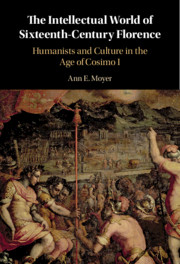Book contents
- The Intellectual World of Sixteenth-Century Florence
- The Intellectual World of Sixteenth-Century Florence
- Copyright page
- Contents
- Illustrations
- Preface
- 1 Florence and Cosimo
- 2 Who Were the Florentines? Etruscan Roots
- 3 Florentine Histories
- 4 Language and Its Study
- 5 Philological Approaches
- 6 Writing about the Arts
- 7 Florentine Customs and Practices
- 8 Conclusions
- Works Consulted
- Index
6 - Writing about the Arts
Published online by Cambridge University Press: 15 July 2020
- The Intellectual World of Sixteenth-Century Florence
- The Intellectual World of Sixteenth-Century Florence
- Copyright page
- Contents
- Illustrations
- Preface
- 1 Florence and Cosimo
- 2 Who Were the Florentines? Etruscan Roots
- 3 Florentine Histories
- 4 Language and Its Study
- 5 Philological Approaches
- 6 Writing about the Arts
- 7 Florentine Customs and Practices
- 8 Conclusions
- Works Consulted
- Index
Summary
Florentines saw their excellence in visual arts as part of their identity. Giorgio Vasari encouraged many colleagues to think seriously about the study of the arts by seeking collaboration for the two editions of his monumental work Lives of the Artists. Borghini, Giambullari, Bartoli, and many others assisted in gathering information; Borghini in particular was involved in composing the sections on periodization. It resembled the narrative on language; the term “ancient” was relevant until late antiquity. The rise of the new tradition had its earliest origins in the eleventh century. It blossomed in the age of Giotto, a narrative that already had a tradition of its own. Innovation in the arts was driven, they argued, by the artist’s drive to compete and to excel. Artistic traditions themselves, like language, could be compared to a living being with a natural lifespan. Florentines founded an academy for artists, the Accademia del Disegno; its first collective task was the memorial service for Michelangelo.
- Type
- Chapter
- Information
- The Intellectual World of Sixteenth-Century FlorenceHumanists and Culture in the Age of Cosimo I, pp. 234 - 276Publisher: Cambridge University PressPrint publication year: 2020

